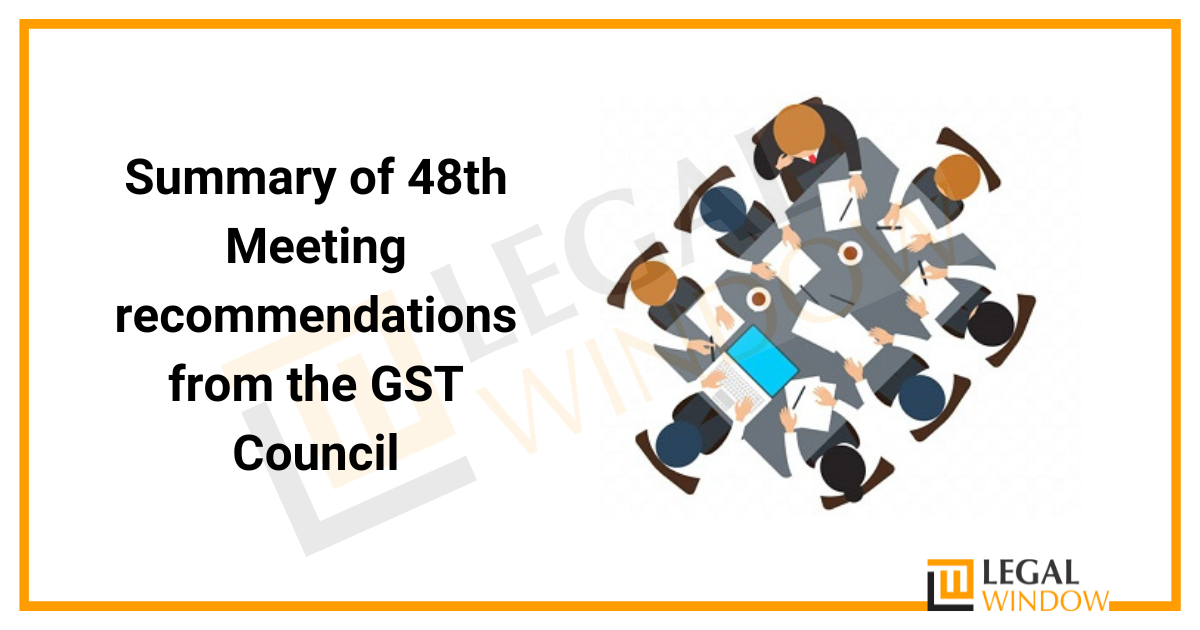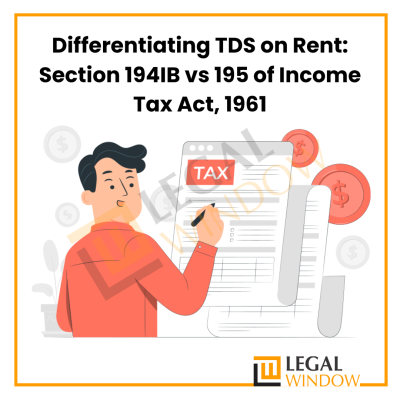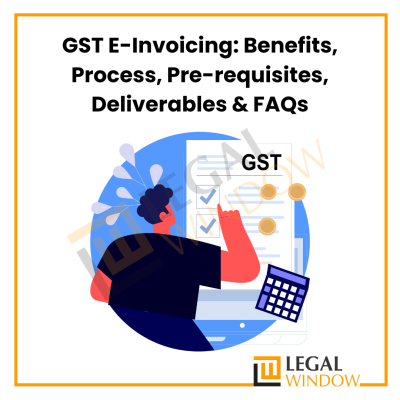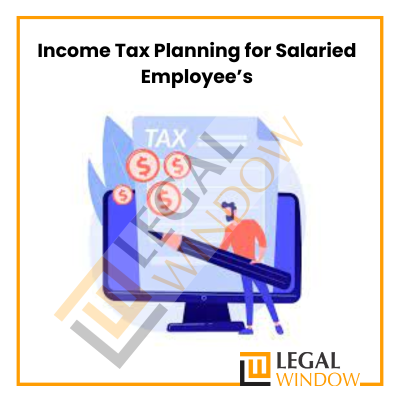 The GST Council was formed to oversee the Goods and Services Tax (GST) legislation. The GST Council is a combined forum of the Centre, states, and Union Territories (UT) that makes recommendations to the Centre and states/UT on critical GST issues. At the GST Council meeting, the Council operates based on cooperative federalism and hence plays an essential role in the implementation of the GST law in India. The Council meeting was followed by a news conference emphasizing the important decisions adopted at the meeting, including the decriminalization of GST crimes and steps to ease GST compliance. In this article, we will look into the Summary of the 48th Meeting recommendations from the GST Council.
The GST Council was formed to oversee the Goods and Services Tax (GST) legislation. The GST Council is a combined forum of the Centre, states, and Union Territories (UT) that makes recommendations to the Centre and states/UT on critical GST issues. At the GST Council meeting, the Council operates based on cooperative federalism and hence plays an essential role in the implementation of the GST law in India. The Council meeting was followed by a news conference emphasizing the important decisions adopted at the meeting, including the decriminalization of GST crimes and steps to ease GST compliance. In this article, we will look into the Summary of the 48th Meeting recommendations from the GST Council.
| Table of Content |
The GST Council
The Indian government formed the GST Council to supervise the application of the goods and services tax in India. The GST Council is an elite member council that creates or modifies any GST law or rule in India.
The Council oversees the taxation process under the GST statute to assist the CBIC and to take actions to combat GST fraud and tax avoidance. In its meetings, the GST council examines and recommends changes to the GST law, such as GST rates, return deadlines, filing systems, and so on. The CBIC then notifies these suggestions to become part of the GST statute.
Constitution of GST Council
The GST Council was created in line with Article 279A (1) of the modified Indian Constitution or the Constitution (One Hundred and First Amendment), Act 2016. It was established by the President of India sixty days after the application of Article 279A, on September 12, 2016. The GST Council office is located in New Delhi, the national capital, and the GST Council Secretariat oversees the GST Council’s operations.
The Union cabinet also distributes cash for paying the costs (recurring and non-recurring) of the GST Council Secretariat, the cost of which is wholly paid by the Central government.
The Union Finance Minister (FM), Smt. Nirmala Sitharaman serves as the chairperson of the GST Council. The Union Minister of State, who is in charge of the Revenue of Finance, and the Revenue Secretary provide assistance to the Union FM.
Members also comprise the Chief Minister, top officials from the Ministries of Finance and in-state and UT Ministries, and the separate state Finance Ministers who represent each state and Union Territory.
Reason for the establishment of GST Council
The main goal of the GST Council was to make important decisions in accordance with the GST law’s slogan of “One nation, one tax” in a cooperative and amicable manner.
The GST Council’s main duty is to provide a consistent GST rate for products and services across the country. It suggests GST exemptions with or without restrictions, the GST filing deadline, GST processes, and adjustments to the tax filing dates that apply to taxpayers across India. When it meets, it also periodically evaluates the GST collections, suggests unique ways to increase revenue and reduce tax fraud, and suggests unique GST rules for particular states.
The Functions of the GST Council
Following the creation of the agenda, the GST Council meeting is called by the Ministry of Finance. The GST Council establishes the following GST legislation, regulations, and principles:
- Procedures for adjudication, appeals, preliminary determinations, sanctions, and prosecution
- Rules for location, timing, and valuation
- Thresholds for GST Registration, whether GST Returns are applicable, or how GST Compliance, including e-invoicing and e-way bills, is required
- The procedure for submitting GST returns, the availability of Input Tax Credits, and the required documents
- GST rates for the provision of goods and services, GST exemptions, the GST composition system, and the implementation of the reverse charge
- Goods and Services free from GST
- When a natural catastrophe or tragedy strikes, there are special charges for generating additional resources.
- GST rates are different for some states
Working of GST Council
The GST Council must regularly convene in person or digitally at predetermined locations. Such GST Council sessions always include the CBIC as an invited guest. The GST Council is required to convene at least once every three months; however, this requirement hasn’t always been maintained.
At its meeting, the GST Council will make important GST-related recommendations to the Union and the States. In order to thoroughly research and report on the topics brought up before the GST Council, a Group of Ministers (GoM) or committee of Ministers is created to address specific tax concerns or the expansion of the GST revenue. The GST Council will ultimately decide whether or not the GoM agrees on the in-probation matter.
A specific suggestion put out or brought before the GST Council by the Ministers or GoM is the subject of discussion and a vote by the GST Council members in a meeting. If the GST Council is unable to agree on a particular issue, the meeting is postponed so that the GoM can do further research before making a decision. The CBIC is not able to cast any votes.
Summary of 48th Meeting recommendations from the GST Council
Today in New Delhi, the GST Council convened in a virtual session under the chairmanship of Smt. Nirmala Sitharaman, Union Minister for Finance & Corporate Affairs. In its 48th meeting, the GST Council issued a number of suggestions about adjustments to the GST tax rates, trade facilitation measures, and efforts to streamline GST compliance. All of the council’s recommendations have been covered in a news release by the government. The main recommendations are:
- In the event that a contract or agreement for the provision of services, such as the building of a flat or home or a long-term insurance policy, is terminated, the Council proposed amending the CGST Act, 2017 to specify the method for filing a refund claim by unregistered buyers.
- The modifications permitting composition taxpayers and unregistered suppliers to make the limited intrastate supply of products through E-Commerce Operators (ECOs) were approved by the Council. The council has suggested that the plan be put into effect starting on January 10th, 2023.
- The Council has suggested that:
-
- Raising the minimum tax threshold for starting a GST prosecution from Rs. 1 Crore to Rs. 2 Crores, with the exception of cases involving fraudulent invoices.
- Change the range of the compounding amount from the current 50% to 150% of the tax amount to 25% to 100%
- Decriminalize some offences, such as obstructing or impeding an officer’s performance of their responsibilities, purposeful tampering with tangible evidence, and failing to provide information.
-
- The Council also resolved to limit the time a return or statement may be filed to a maximum of three years from the date the return or statement is required to be filed.
- The Council proposed running a pilot programme in Gujarat for risk-based physical registration application verification and biometric-based Aadhaar authentication. To combat the problem of phoney and fraudulent registration, this is advised.
- The Council further explained that:
-
- Rab (Rab-Salawat) falls under CTH 1702 and is subject to GST at a rate of 18%.
- Extrusion-based fryum production is particularly addressed by CTH 19059030 and is subject to an 18% GST rate.
- SUVs with engines larger than 1500 cc, lengths greater than 4000 mm, and ground clearance of 170 mm or more are subject to a higher rate of compensatory cess of 22%.
- If a registered person rents a residential property to them for their own personal use as their primary residence and on their own account, rather than for their business, then no GST is due.
-
Other suggestions from the 48th Meeting of the GST Council
The following are other suggestions from the 48th Meeting of the GST Council:
- As discussed earlier, the Council suggested increasing the threshold from Rs. 1 crore to Rs. 2 crores for filing a GST prosecution in order to decriminalise GST-related offences. With the exception of bills made for the non-provision of goods or services, it would apply to all situations. The Council also suggested lowering the amount of compounding from 50% to 150% of the tax amount to 25% to 100%. Additionally, other offences would lose their criminal penalties, such as intentionally tampering with evidence, interfering with an officer’s performance of their responsibilities, and failing to disclose information when requested.
- The Council also suggested making it easier for micro businesses to use e-commerce. This choice is predicated on the previous Council meeting’s in-principle acceptance, which permits composition taxpayers and unregistered suppliers to provide items within the state via an e-commerce operator. Both the GST Act and the GST Rules have been modified to support the same as a result of the GST Council’s approval. The programme could be put into effect on October 1, 2023.
- The GST Council has suggested changing Rule 37(1) of the CGST Rules, 2017 with retroactive effect beginning on October 1, 2022, in accordance with the second clause of Section 16 of the CGST Act, 2017. The input tax credit (ITC) will be adjusted in accordance with the amount that was not paid to the supplier for the value of the supply, including any taxes owed.
- The Council also suggested that Rule 37A be introduced to the CGST Act, 2017. This will give taxpayers who have not yet paid the required amount of tax by the deadline a way to reverse the ITC. Additionally, it will give you a way to get your money back if the supplier ends up paying taxes. As a result, it will be simpler to comply with Section 16(2) (c) of the CGST Act, 2017.
- Additionally, the government plans to alter Sections 37, 39, 44, and 52 of the CGST Act, 2017, to limit the amount of time that returns or statements may be filed after the filing date to a maximum of three years. Additionally, the CGST Act of 2017’s sections 52 and 9(5) will be added to the Form GSTR-1 to provide reporting information on supplies made through e-commerce operators covered by those provisions.
- The CGST Rules, 2017 will also include a new Rule 88C and Form GST DRC-01B to notify taxpayers where the difference between their reported liabilities in Form GSTR-1 and GSTR-3B for a given tax period exceeds the predetermined thresholds. Taxpayers will then be able to cover the difference obligation or provide an explanation.
- In accordance with Rule 59(6) of the CGST Rules, 2017, if the taxpayer has not deposited the amount mentioned in the intimation or offered an explanation, they shall be prohibited from filing Form GSTR-1 for a subsequent tax period. If taxpayers paid the discrepancy in stated obligations or provided an explanation, tax authorities would not be obligated to step in.
- The GST Council also decided to make it clear that the “No Claim Bonus” provided by insurance firms will be deducted from the valuation of insurance services, among other things. The same will not be subject to GST. If a registered individual rents a residential property in their own capacity and on their own behalf—that is, not for commercial purposes—there will not be any GST due. Additionally, the incentives given to banks by the Central Government under the programme to promote RuPay Debit Cards and low-value BHIM-UPI transactions would not be taxed.
 Endnote
Endnote
The 48th meeting of the GST Council in 2022 will be the final one for this fiscal year and maybe the final one before the Budget in 2023. To ensure that you receive all the pertinent details, be sure to note December 17 as the date of the 48th GST Council Meeting on your calendar.
Additionally, keep an eye on this area for news and updates about the 48th GST Council meeting press release and announcement.
You can also take assistance from our Experts at Legal Window if you need assistance in GST Related Services, Our Experts would be Happy to Help.
CA Pulkit Goyal, is a fellow member of the Institute of Chartered Accountants of India (ICAI) having 10 years of experience in the profession of Chartered Accountancy and thorough understanding of the corporate as well as non-corporate entities taxation system. His core area of practice is foreign company taxation which has given him an edge in analytical thinking & executing assignments with a unique perspective. He has worked as a consultant with professionally managed corporates. He has experience of writing in different areas and keep at pace with the latest changes and analyze the different implications of various provisions of the act.
Categories
- Agreement Drafting (23)
- Annual Compliance (11)
- Change in Business (36)
- Company Law (148)
- Compliance (90)
- Digital Banking (3)
- Drug License (3)
- FEMA (17)
- Finance Company (42)
- Foreign Taxation (6)
- FSSAI License/Registration (14)
- GST (120)
- Hallmark Registration (1)
- Income Tax (202)
- Latest News (34)
- Miscellaneous (165)
- NBFC Registration (8)
- NGO (14)
- SEBI Registration (6)
- Section 8 Company (7)
- Start and manage a business (21)
- Startup/ Registration (130)
- Trademark Registration/IPR (40)
Recent Posts
About us
LegalWindow.in is a professional technology driven platform of multidisciplined experts like CA/CS/Lawyers spanning with an aim to provide concrete solution to individuals, start-ups and other business organisation by maximising their growth at an affordable cost.








